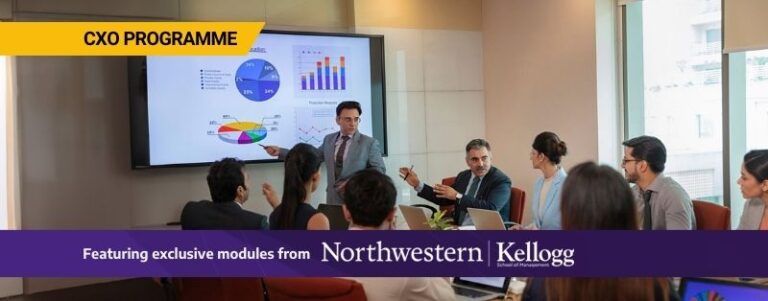What is Managerial Accounting? A Comprehensive Guide for 2023

- What is Managerial Accounting?
- How Does Management Accounting Work
- Objectives of Management Accounting
- Types of Managerial Accounting Methods
- Managerial Accountant Job Description
- Key Managerial Accounting Skills and Techniques
- How to Get a Job in Managerial Accounting
- Learn Managerial Accounting With Emeritus
A managerial accountant is a pivotal cog in an organization’s wheel. They communicate financial information in such a way that it helps the management make business decisions. If you have a business-oriented mindset, a talent for numbers, and the necessary technical skills, managerial accounting is a fantastic career path.
What is Managerial Accounting?

Managerial accounting is a branch of accounting that provides financial information to a company’s management team for use in decision-making and planning. The information is not typically intended for external stakeholders, such as investors or regulators, but is used internally to guide the company’s operations and strategy.
As per Glassdoor, the average salary of managerial accountants is ₹9,00,000 annually. Managerial accountants tend to earn competitive salaries due to their specialized skill set and the value they provide to their organizations.
Earning an advanced degree allows aspiring managerial accountants to increase their earnings and stand out in the job market. The following article discusses managerial accounting, its types, career outlook, and how it differs from financial accounting.
How Does Management Accounting Work
Management accounting refers to the study of managerial aspects of financial accounting. Its task is to redesign accounting in a way that assists management in developing policies and monitoring their implementation.
Managerial accountants analyze various events and operational metrics step by step in order to facilitate the translation of data into useful information. This information is then used by the company’s management in their decision-making process. They typically examine the company’s individual product lines, operating activities, facilities, and other comparable parameters.
These accountants are particularly concerned with the costs of products or services purchased by the company and the company’s actual ROI. Ratio analysis, cost-volume-profit analysis, job order costing, standard costing, and variance analysis are a few other analysis methods in managerial accounting.
Characteristics of Management Accounting
Management accounting is all about recording, analyzing, and presenting financial data to management. The data presented is useful and helpful in systematically and effectively planning and running business operations. The basic characteristics involve:
1. Financial Information
The primary goal of management accounting is to provide financial information to management. The information is presented in a format that allows various levels of management to review policies and make decisions.
2. Cause and Effect Analysis
On the one end, financial accounting calculates the figures related to profit and loss accounts and the balance sheet. On the other end, management accounting also investigates the cause and effect of facts and figures. For instance, if a loss occurs, the causes are investigated. If there is a profit, the variables that affect the profit are also examined respectively.
3. Use of Special Techniques and Concepts
Management accounting is based on special techniques and concepts, such as standard costing, cash flow, and so on, to make accounting data more useful.
4. Decision Making
To make relevant decisions in the present and future, management accounting helps in providing relevant information to management. Historical data serves as a foundation for predicting future impact. It helps you make decisions in selecting the most advantageous course of action.
ALSO READ: What is Financial Accounting? How Does it Help a Business?
Objectives of Management Accounting
Management accounting focuses on managing the internal financial processes of a business. It also assists in maintaining communication of a company’s financial data regarding revenue and expenses to support business decisions on product development, budgeting, and analyzing revenue streams.
1. Financial Process Management
Managerial accountants must track and measure the company’s internal financial operations to ensure that overall profitability grows consistently.
2. Tracking Revenue, Sales, and Expenses
Management accounting can also be used to track revenue and sales, and the costs associated with providing a company’s products or services. Revenue and expenses are the two most important metrics for businesses to track and measure, and managerial accountants perform regular evaluations and reports on this data.
3. Creating Business Budgets
Management accounting is extensively used to create and implement company budgets. Managerial accountants use the available data about a company’s financial status to identify areas where spending can be reduced, or revenue can be increased.
Types of Managerial Accounting Methods
Several accounting methods can be used to achieve your organization’s specific goals.
1. Capital Budgeting Analysis
When a company invests in capital assets, it must determine whether the assets’ benefits outweigh the investment’s costs. This evaluation then assists the marketers in deciding whether or not to invest. Capital budgeting analysis enables managers and business owners to identify which projects are likely to yield higher returns over a given time period.
2. Inventory Costing Management
Inventory costing is the process of assigning monetary value to inventory. This includes all of the company’s goods, from raw materials to unfinished products to finished goods. It shows them how much their inventory costs, including overhead costs like storage and administration fees, giving them a broader range of options.
3. Budgeting Management
It allows businesses to plan ahead of time. The company can set goals for the period, and accounting firms can help in developing a budget to achieve them. Businesses must have a well-planned budget in order to keep track of their finances.
4. Cash Flow Analysis
It examines the movement of cash for operational, financial, and investment activities. It provides a clear picture of the company’s financial health to the management.
5. Trend Analysis and Forecasting
It employs current and historical data to forecast what is likely to occur in the future. The majority of businesses use forecasting methods to develop strategies to improve their processes for better results.
6. Managerial Accounting Vs. Financial Accounting
There is a significant difference between managerial accounting and financial accounting depending on the subjects mentioned below.
7. Relevance
Managerial accounting is concerned with an organization’s internal financial processes. On the other hand, financial accounting is concerned with its external financial processes.
8. Strategic Growth
Managerial accountants concentrate on short-term growth strategies for economic maintenance. However, financial accountants concentrate on long-term financial strategies for organizational growth.
9. Reports
Managerial accountants typically prepare reports for internal audiences. Financial accountants follow established formats since the reports are prepared for external stakeholders like shareholders, potential investors, executives, etc.
10. Example
Managerial accountants can conduct a make-or-buy analysis to determine the financial viability of producing a part to aid in the production of a product. However, financial accountants adhere to Generally Accepted Accounting Principles (GAAP) issued by an agency like Financial Accounting Standards Board (FASB).
ALSO READ: What is Asset Management? Does it Ensure Business Growth?
Managerial Accountant Job Description

Managerial accountants can work for public, private, government agencies, or non-profit organizations. While the job description of a managerial accountant may differ from one organization to the next, their duties and responsibilities usually include:
- Preparing financial and transactional data for a business
- Analyzing product or service costs and segmenting the data for various cost and/or revenue centers
- Assessment and management of financial risks
- Keeping track of and analyzing cost and revenue data to help the company budget and perform optimally.
Key Managerial Accounting Skills and Techniques
Managerial accountants should have the skill set to produce accurate financial statements and identify cost-cutting opportunities. These accountants are responsible for conducting in-depth financial investigations into every aspect of the company’s operations (from costs of goods sold to net present value) using key performance indicators as benchmarks.
Managerial accountants use techniques such as margin analysis which assists business leaders in understanding what drives profitability. They also need to closely monitor market conditions and cost-related trends to stay ready for future consequences.
How to Get a Job in Managerial Accounting
With an accounting degree, you can pursue various jobs and careers. Managerial accounting can be applied to various career paths, providing a lifetime of satisfaction and ample pay. You could begin your career in an accounting firm and progress to become a top accountant for a manufacturing firm. You could even work as an independent consultant or start your own business.
Learn Managerial Accounting With Emeritus
Without managerial accounting, corporate leadership will struggle to make appropriate decisions or be unaware of the firm’s true financial picture. Hence, corporations will always require qualified and skilled managerial accountants. Professionals interested in a financial or managerial accounting career should consider pursuing an advanced degree in accounting to meet the ever-changing demands.
If you want to advance your career in this field, Emeritus’ online banking and finance courses could be extremely beneficial. It is critical to select courses that best fit your schedule and pace of learning, as well as those that focus on your specific areas of interest.
By Mikhil Pathak
Write to us at content@emeritus.org





